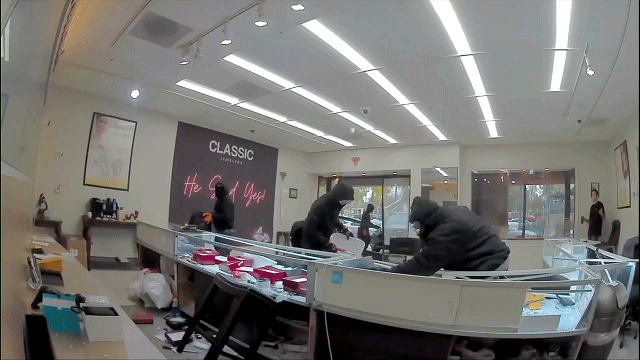'Enter at your own risk': Texas police union puts up billboards outside Austin
Reaction from Texas Lt. Gov. Dan Patrick and Lt. Randy Sutton, host of 'Blue Lives Radio.'
Austin has seen a spike in violent crime and officer retirements after the city council voted over the summer to immediately slash $20 million from the police department budget, becoming the first major Texas city to do so.
In August, Austin City Council members voted unanimously to cut about $150 million, or roughly one-third, from its police department and allocate those funds to areas like violence prevention, housing and mental health services. Only about $21.5 million was immediately removed from the department's funding in part by canceling three upcoming cadet classes and slashing overtime expenses.
"It is demoralizing for the officers. It is angering for the citizens because they're having to wait longer for officers to get the calls. And it's unsafe for citizens and officers," Austin Police Association President Ken Cassidy told Fox News.
TEXAS POLICE GROUP WARNS DRIVERS TO 'ENTER AT YOUR OWN RISK' AFTER AUSTIN CUTS POLICE FUNDING
Since voting to defund the police, Austin, a historically low-crime city, has seen an uptick in murders and aggravated assaults, according to data from the Austin Police Department's September crime report. So far this year, Austin has seen 35 murders, compared to 25 in all of 2019, a percentage increase of 40%. In September, the city saw three murders, compared to two last year.
The number of aggravated assaults is also on the rise, jumping by 18% from last year, when 1,972 were reported, to 2,333 reported in the first eight months of this year.
"Our murder rate's the highest it's ever been," Cassidy said.
The department is also coping with an abnormally high attrition rate. Officers attribute the higher-than-usual departure rate to what they view as anti-police sentiment and a lack of support by community members and city leaders.
Over the last five months, the department, which has about 1,730 sworn officers, has lost double the number of officers than it typically would have, Cassidy said. On average, about seven employees left per month; now, it's up to 14.
"[It's] caused a mass exodus of people who are retiring," Cassidy said. "And I think what they didn’t expect is resignations and officers leaving the department to go work for other cities."
Over the summer, Texas Gov. Greg Abbott, a Republican, threatened to permanently block cities from raising property taxes if their local governments passed measures defunding law enforcement. He later indicated that he was considering a proposal that would bring Austin police under control of the state government — an option that's still on the table.
TEXAS GOVERNOR EXTENDS EARLY VOTING FOR NOVEMBER ELECTIONS BY 1 WEEK
"To defund the police, like what we've seen in Austin, and what's reverberating in cities across the state ... they are disgraceful," Abbott said Wednesday, after signing a pledge to "Back the Blue." "They are reckless. It invites crime into our communities, and it endangers law enforcement officers and their families."
The movement to "defund the police" — redirecting funds away from police departments toward other government agencies — gained traction among activists after the death of George Floyd, a Black man, at the hands of a White Minneapolis police officer in May. Cities around the country, including New York City, Los Angeles and Portland, have also reallocated funding from their police department budgets.
Austin voted to cut police funding after an officer shot and killed Mike Ramos, an unarmed Black and Hispanic man who was driving away from police, in April, prompting citywide protests. The Austin Police Department was criticized heavily for its response, accused of using tear gas, rubber bullets and pepper spray against non-violent protesters.
An investigation into the officer who shot and killed Ramos, Christopher Taylor, is ongoing.
“I was an early supporter of Chief Manley but have become incredibly disappointed in what feels like complete disregard for the reform efforts this council has consistently tried to implement,” Mayor Pro Tem Delia Garza said in June.
TEXAS' ABBOTT ASKS CANDIDATES TO SIGN PLEDGE AGAINST SLASHING POLICE FUNDING
But some opponents of defunding the police have instead advocated for using that money and putting it toward better training, hiring and equipment for officers. A recent Police Executive Research Forum survey of 281 police agencies found that the average young officer received 58 hours of firearms training and 49 hours of defensive tactical training, but just eight hours of de-escalation training.
On top of that, 93% of the agencies said they provide in-service training on how to use firearms, while just 65% said they provide training on de-escalation skills.
In Texas, police departments on average require officers to complete 696 hours of basic training before joining the force, according to data collected by the Criminal Justice Training Reform. (By comparison, military training can last anywhere from seven weeks for the Navy to 12 weeks for the Marine Corps).
"Are all law enforcement officers perfect? Absolutely not," Abbott said recently. "We want to hire better officers. We want to train them better. Those things do require more funding though."
Austin Mayor Steve Adler did not respond to a request for comment. Austin City Council Member Greg Casar, an advocate of cutting funding for the police force, declined to comment.
"Time will tell how this works out," Cassidy said. "Right now, it’s not safe for anybody, especially when your officers don’t feel supported by your local government."










































